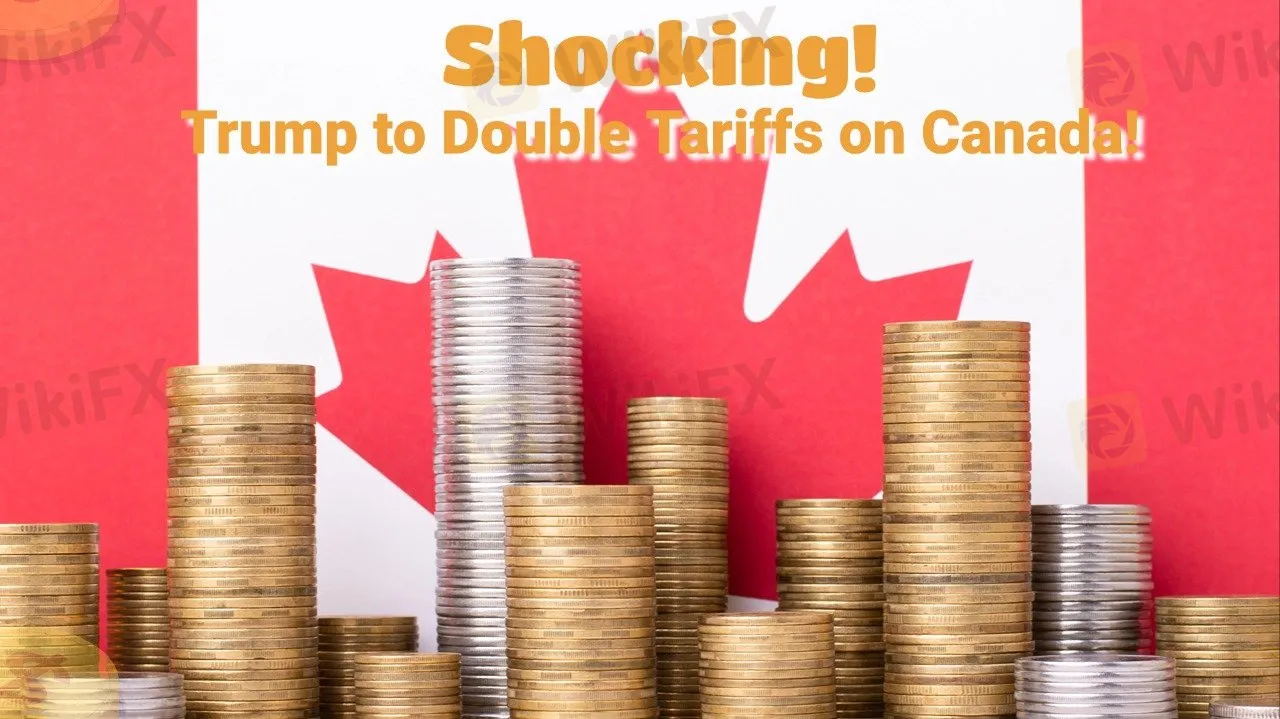简体中文
繁體中文
English
Pусский
日本語
ภาษาไทย
Tiếng Việt
Bahasa Indonesia
Español
हिन्दी
Filippiiniläinen
Français
Deutsch
Português
Türkçe
한국어
العربية
Shocking! Trump to Double Tariffs on Canada!
Abstract:Trump announced a tariff hike on Canadian steel and aluminum to 50%, shaking the markets. The Canadian stock market took a hit, the Canadian dollar plummeted, and U.S. steel and aluminum stocks surged, triggering strong reactions from all sides.

U.S. President Donald Trump recently declared an additional 25% tariff on Canadian steel and aluminum imports, bringing the total tariff rate to 50%.
This decision was made in response to Ontario‘s move to impose a 25% tax on electricity exports to the U.S. Trump stated that the tariff increase was a countermeasure against Canada’s trade policies and warned that if Canada did not withdraw its tariffs, the trade war could escalate further.
The announcement sent shockwaves through global markets. Both U.S. and Canadian stock markets fell, the Canadian dollar plunged, while U.S. steel and aluminum stocks surged. Later, Trump hinted at a possible concession on the tariff issue, briefly easing market concerns.
By 4 p.m. Eastern Time, the White House confirmed that the existing 25% tariffs on steel and aluminum would take effect at midnight, though no details were provided on the enforcement of the 50% tariff.
Canada responded firmly, refusing to yield to Trump‘s pressure and even threatening to cut off electricity supplies to the U.S. Former U.S. Treasury Secretary Larry Summers criticized the policy as “self-inflicted harm,” warning that it could worsen recession risks. Meanwhile, the UK government stated that it would not respond to Trump’s tariff threats but would continue seeking an exemption.
Overall, Trumps decision not only strained U.S.-Canada relations but also created economic and political uncertainty on a global scale.
Disclaimer:
The views in this article only represent the author's personal views, and do not constitute investment advice on this platform. This platform does not guarantee the accuracy, completeness and timeliness of the information in the article, and will not be liable for any loss caused by the use of or reliance on the information in the article.
Read more

Nonfarm Data Lifts Market Sentiment, U.S. Stocks Rebound Strongly
U.S. nonfarm payrolls for May slightly exceeded expectations, stabilizing investor sentiment and easing fears of a hard landing. This upbeat data sent U.S. equities broadly higher, led by tech stocks, with the Dow and S&P 500 posting significant gains. However, behind the optimism lies a fresh round of market debate over the Federal Reserve’s rate path, with uncertainty around inflation and interest rates remaining a key risk ahead.

OctaFX Flagged by Malaysian Authorities
OctaFX has been officially listed on warning lists by both Bank Negara Malaysia (BNM) and the Securities Commission Malaysia (SC). These alerts raise serious concerns about the broker’s status and whether it is legally allowed to operate in Malaysia.

TradingPRO: A Closer Look at Its Licences
In an industry where safety and transparency are essential, the regulatory status of online brokers has never been more important. For traders seeking to protect their capital, ensuring that a platform operates under recognised and stringent oversight can make all the difference. Keep reading to learn more about TradingPRO and its licenses.

Oil Price Breakout Incoming? Investors Should Stay Alert
Oil prices are hovering around a critical level, with potential yet to be fully unleashed. Investors must prepare for sudden changes.
WikiFX Broker
Latest News
IronFX Broker Review 2025: A Comprehensive Analysis of Trustworthiness and Performance
OctaFX Flagged by Malaysian Authorities
Nonfarm Data Lifts Market Sentiment, U.S. Stocks Rebound Strongly
Why Your Worst Enemy in Trading Might Be You
Errante Broker Review
Currency Calculator


